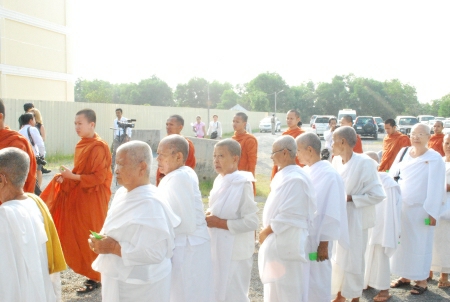“I don’t feel vengeful, but I am glad they are finally facing trial”, said Sao Yoeun, speaking to me at the Documentation Centre for Cambodia, an invaluable resource for anyone looking back at the Khmer Rouge era. She travelled 200 miles from Kampong Thom province to see the four surviving leaders of the Khmer Rouge finally have their day in court, more than thirty years after the regime’s almost 4 year reign of terror caused the deaths of around a quarter of Cambodia’s people
Sao Yoeun (right) in conversation at DC-CAM (Photo: Simon Roughneen)
Now 55, Sao Yoeun survived being press-ganged into the Khmer Rouge labour force before 1975, when the rebels took control of the country and embarked on a destructive quest to turn Cambodia into an agrarian communist dystopia, emptying the country’s towns and cities in the process.
After 1975, she and others were forced to create medication from scratch and test it on themselves. Those who refused were taken away to one of the country’s detention centres, where prisoners were interrogated, tortured and then killed in one of the 200 or so Killing Fields that have been discovered across the country.
She recalls that the one man in her team who knew some chemistry was executed after he showed the others how to prepare basic medication. He had served his purpose. “To keep you is no gain, to lose you is no loss”, the local Khmer Rouge boss told her, an ominous warning that she says echoes down the decades.
It is for the planning and ordering of crimes such as this, on a mass scale, that Nuon Chea, Pol Pot’s right-hand man, Khieu Samphan, the head of state, regime foreign minister Ieng Sary and ironically-titled social affairs minister Ieng Thirith, a Shakespeare scholar and sole female among the four, have been brought to trial. 350,000 pages of evidence have been compiled, though this only covers selected cases of execution sites, jails, and labour camps, by the prosecutor at the Extraordinary Chambers in the Courts of Cambodia (ECCC), to give the tribunal its official title.
“A cathartic moment for all Cambodians” is how Ou Virak, who lost family to the Khmer Rouge and is now head of the Cambodian Center for Human Rights, described the trial. Catharsis could be slow in coming, however. The trial could take 2-3 years, and the accused’s lawyers immediately made the case on Monday that the tribunal is flawed, and that a prior pardon issued to Ieng Sary means that no case can be made against him.
Nuon Chea, Brother Number 2 to Pol Pol’s Brother No 1, upset the watching Khmer Rouge survivors in a packed public gallery on Monday morning, by saying, through his lawyer, that he is not happy with the hearing, complaining that his suggested witnesses were not accepted by the tribunal. He then walked out of the proceedings, faux-defiant in sunglasses and an incongruous-looking black and white wooly hat, saying he will only attend the court when his case comes up.
The others, all aged between 79 and 84, at various times sought to rest in their cells or beckoned security personnel over to help them to the bathroom, during proceedings held behind bulletproof glass at the ECCC. Ieng Thirith appeared to doze off at several points, while Ieng Sary left the chamber at one point, complaining that his back hurt. Khieu Samphan, whose 1959 Sorbonne doctoral thesis, “Cambodia’s Economy and Industrial Development”, in some ways foreshadowed the ideology-driven destruction to come, appeared to be the liveliest and most interested of the quartet, reading documents and turning to his counsel at various points to apparently discuss points being made by the prosecutors and the civil party lawyers, who took to the floor on Wednesday.
The tribunal has spent US$109 million to date, with around half the money coming from Japan and most of the rest from western governments. Last year Comrade Duch, the head of the Tuol Sleng jail and Choeung Ek killing field, where around 14,000 people were murdered, was sentenced to 19 years for his crimes, the first conviction handed down by the tribunal.
He will be back in the court to testify during this bigger case against those who ran the movement, but the tribunal has been hit with controversy lately. The Cambodian Government does not additional cases go ahead, saying, without explanation, that these could lead to another civil war. Cases 003 and 004 are thought to refer to next-to-top ranking Khmer Rouge, such as senior army, navy and airforce personnel. Several court staff resigned in recent weeks after the investigating judges decided not to pursue the third case, after what victims groups said was a half-baked investigation.
One man who wants to see Cases 003 and 004 cases go ahead is Rob Hamill, a former New Zealand Olympic rower whose brother Kerry and English friend John Dewhirst were arrested by the Khmer Rouge navy while sailing close to the Cambodia coast in 1978. He was never seen again, murdered at the Toul Sleng torture camp. Mr Hamill told me by email that despite the four surviving Khmer Rouge leaders finally coming to trial last week, he feels that the legacy of the court will be one of failure, if the additional cases are not pursued.
 Facebook
Facebook  Twitter
Twitter  Soundcloud
Soundcloud  Youtube
Youtube  Rss
Rss 
